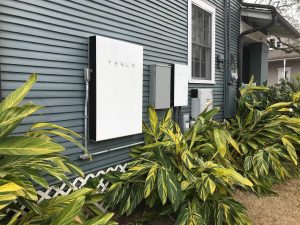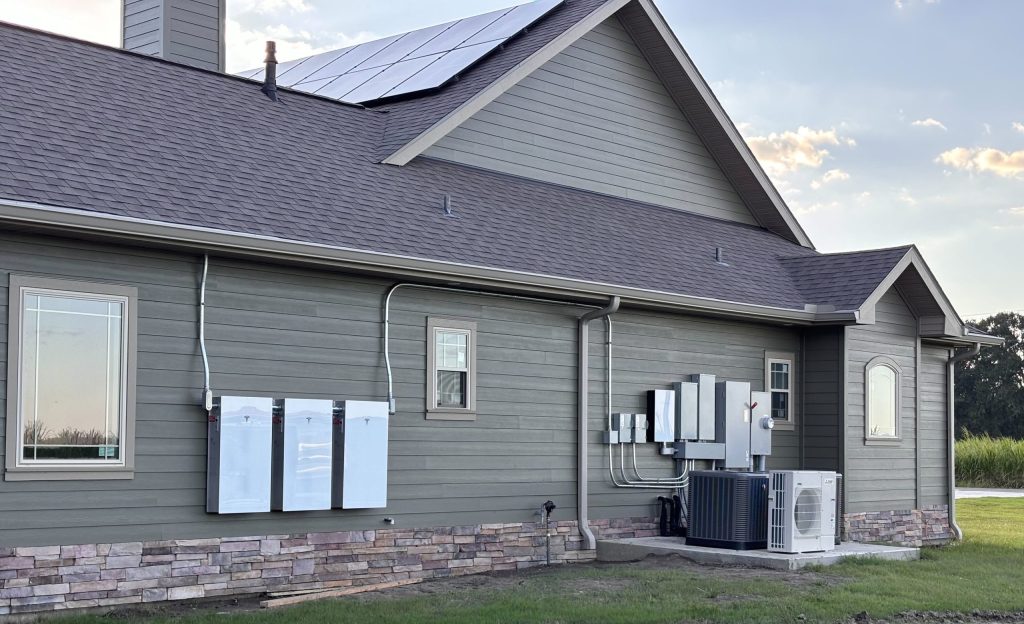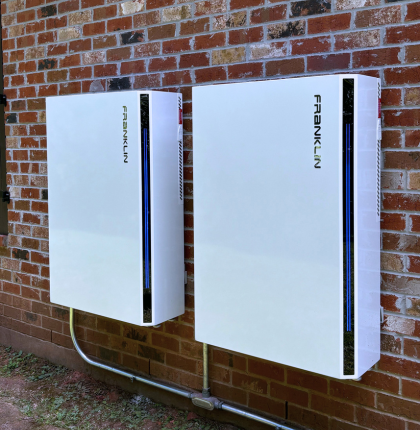How do solar batteries work, and why are they essential for reliable energy? Solar batteries turn sunlight into around-the-clock power, keeping homes and businesses running through the night, severe weather, and grid outages. Solar batteries are more than just storage; they’re the key to true energy independence. In an era of unpredictable weather and power outages, Gulf Coast residents are looking for greater control over their energy and understanding the importance of reliable energy and how it works will help business owners and homeowners make informed decisions for their energy needs.

A solar battery system allows homes and businesses to store unused solar energy for later use, like at night, on cloudy days, or during grid outages. These systems provide reliable backup power and help homes and businesses increased their independence from the electrical grid. Battery storage systems also enhance the efficiency of solar systems by maximizing the use of energy generated by solar panels.
With backup battery storage, owners can maximize the benefits of their solar system and use their self-generated power to its full potential. Without a battery, any extra electricity goes back to the grid instead of being used by the owner.
Solar panels and batteries work together to create a dependable system that can efficiently power homes and businesses around the clock. During sunlight hours, solar panels convert sunlight into electricity for immediate use. Any extra power generated can then be used to charge a battery instead of being sent back to the grid. When the sun sets or during a power outage, the battery is charged and ready to keep essential appliances powered.
Solar battery systems can be used in different ways depending on energy needs and priorities. Some systems are designed to maximize self-consumption, storing excess energy during the day for use at night. Others focus on backup power, ensuring electricity is available during outages. Understanding these modes helps in selecting the best setup for a home or business.
Excess solar energy is stored in the battery during daylight hours. When solar production decreases in the evening or during cloudy conditions, the battery supplies stored power to reduce dependence on the grid. This helps lower electricity costs and increases energy efficiency.
In the event of a power outage, the battery automatically supplies electricity to essential appliances and systems. The length of time that backup power is available depends on battery capacity and energy demands.
Understanding how batteries store and release energy helps homeowners make informed choices about reliability and efficiency. Most modern home solar battery systems use lithium-ion batteries, the same type found in smartphones, laptops, and electric vehicles. Lithium-ion batteries are more efficient, last longer, and charge faster compared to older alternatives, such as lead-acid batteries. Although lead-acid batteries are more affordable, they have shorter lifespans and require more maintenance, making them less practical for long-term residential or commercial use.
What makes lithium-ion batteries so effective is the way they store and release energy. Inside the battery, a chemical reaction moves electrons between two materials through a liquid called lithium-salt electrolyte. During charging, energy from solar panels drives this reaction in one direction to store electricity. When power is needed, the reaction reverses, converting stored energy into usable electricity. This process ensures a steady energy supply, regardless of sunlight or grid conditions.
Most solar installations use lithium-ion batteries because they:
This older technology offers:
While both types work, lithium-ion batteries have become the standard for home energy storage due to their superior performance and reliability.
Solar battery systems come in two main configurations: AC-coupled and DC-coupled. Solar panels generate DC (direct current). However, homes and businesses run on AC (alternating current) electricity, since it is the standard for power grids and appliances. To bridge this gap, inverters convert DC power from solar panels into AC electricity that can be used immediately. When energy is stored in a battery, it remains in DC form, but must be converted back to AC before it can be used to power appliances. Choosing the right system depends on energy needs, whether integrating with an existing setup or designing a new installation.
In an AC-coupled system, solar panels generate DC electricity, which an inverter converts into AC for immediate use. When charging a battery, this electricity must be converted back to DC, and then to AC again when discharged. While this process involves more conversions and lower efficiency, it offers greater installation flexibility and works well when adding batteries to existing solar systems.
A DC-coupled system is more efficient because the DC electricity from solar panels charges the battery directly before being converted to AC for use. This reduces energy losses and improves overall system efficiency. DC-coupled systems work particularly well in new solar installations where the entire system can be designed and optimized from the start.

Stay up and running with reliable power even during outages with a solar system equipped with backup battery storage. Unlike gas generators, batteries operate silently with no fuel needed and no harmful emissions.
Battery storage reduces reliance on the utility grid by storing excess solar power for later use. This provides more control over energy costs and consumption.
In areas prone to severe weather and grid disruptions, battery systems provide critical backup power to maintain comfort and safety during outages.
A solar and battery system adjusts its energy flow throughout the day based on sunlight availability and household energy needs, ensuring a consistent and efficient power supply. Here’s what one can expect:
As the sun rises, solar panels begin generating electricity. The system first powers the home directly and then uses additional energy to charge the battery. During early morning hours when solar production is still ramping up, the battery may supplement power needs.
On a bright day during peak sunlight hours, solar panels often generate more electricity than needed, depending on the size of the system. This extra energy can then charge the battery. Any additional excess energy flows to the utility grid.
As the sun sets and solar production decreases, the battery provides stored energy to support household power needs. This reduces or eliminates the need to draw electricity from the utility grid during peak evening hours. If the battery becomes depleted, the system will switch to grid power.
When the sky is overcast, solar generation decreases, but a well-charged battery can step in to fill the gap. Instead of drawing electricity from the grid, stored solar power keeps appliances running efficiently, reducing reliance on utility companies.
When extreme weather disrupts the grid, a solar battery system acts as an emergency power source. It automatically kicks in to keep essential appliances running, offering peace of mind and security until grid service is restored.
A solar battery stores excess energy generated by solar panels for later use. It helps reduce reliance on the grid and provides backup power during outages.
The lifespan of a solar battery depends on its type and usage. Lithium-ion batteries typically last 10-15 years.
Yes, most solar panel systems can be retrofitted with an AC-coupled battery storage system, allowing an upgrade without replacing existing panels.
 The Bottom Line
The Bottom LineA solar and battery system provides reliable, independent energy for homes and businesses, ensuring power is available even when the grid is down. By storing excess solar energy, battery storage reduces dependence on the utility grid, lowers long-term costs, and provides peace of mind during outages.
For Gulf Coast residents and business owners, energy independence requires more than solar panels alone—it demands a complete solar energy and backup system that works in every condition. With expertly engineered solar and battery solutions, Solar Alternatives delivers reliable solar energy and battery installations that prioritize reliability and safety.
Solar Alternatives engineers premium solar and battery systems designed for the unique demands of the Gulf Coast region. Schedule a consultation to explore reliable energy solutions for homes and businesses.